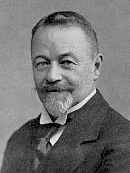
This extract from a lecture by Hermann Jacobi was first published in august 1914 in the Shri Jaina Swetambara Conference Herald and was reissued later in the introductory section of the eight-volume edition Śramaṇa Bhagavān Mahāvῑra by Muni Ratna Prabha Vijaya (Volume I, Part I: Life, Ahmedabad: Śri Jaina Siddhānta Society, 1948, second edition, pp. 78-80).
Extract from a Lecture by Hermann Jacobi
In a lecture delivered by Prof. Hermann Jacobi at Framji Cowasji Institute Bombay, on 13th April 1914 the learned professor says:
"I have been asked by many of my Jain friends, whether I still thought Jainism an off-shoot of Hinduism; for it was believed that I had given expression to that opinion in the introduction to my translation of Jain Sūtras in the Sacred Books of the East.
Now I have never been of opinion that Jainism is derived from Hinduism or Brāhmanism. I believe that Jainism is, in the main, an independent religious system; but as the Jains always lived amongst the Hindus, they most probably exchanged ideas with them and adopted some of their. I may be allowed to go into some details in order to illustrate the relations subsisting between Jainism and Brāhmanism.
The Jain theory of soul or rather their conception of soul has some peculiarities which are in opposition to Brāhmanical theory. The original conception of soul, jīva or life, by the Jains seems to be that it is the life-giving principle; at any rate they contend that the soul or jīva is not of a definite size but contracts or dilates according to the body which it occupies for the time being.
The Brāhmins ascribe to the soul, either infinitely great or small size. And there is in connection with the tenet of jīva, another Jain doctrine peculiar to them viz. that the elements earth, water, fire, wind or rather particles of them are bodies of soul incorporated in them. This belief that matter possesses life is technically called Hylozoism. It is a belief found in its crudest form with many primitive tribes all over the world. Nothing similar to this doctrine of Prithvi-kāya etc. is found in Brāhmanical philosophy, and we may presume that it was not with the Brāhmins but with any other section of the nation.
I may further illustrate the peculiarity of Jain doctrine of jīva by referring to the nigoda. The nigodas are infinitesimally small globules in which are located numberless jīvas who have all animal functions in common. These nigodas are of course invisible. The whole universe, according to the Jains, is literally packed with these infinitesimally small globes. Hence the whole space of the world is densely filled with souls. I need not go into more details about this curious doctrine; the general idea of it will be sufficient to mark it as not Brāhmanical.
I go to another point where the Jains are in opposition to the Brāhmans i.e. the idea of being. The Upaniṣads teach that being is permanent unalterable without attributes and one in all things. This is a metaphysical conception. The idea of being does not admit of origin or destruction. This is the oldest philosophy of the Brāhmans. Their position has not been accepted by the later philosophers except the Vedantins but the Upaniṣad doctrine about being as one has influenced in a marked degree all later philosophical speculations whether Sāṅkhya and Yoga or Vaiśeśika and Nyāya and even the peculiar belief of the Buddhists, which denies permanent being and replaces it by a continuous originating is but a protest against the Brāhmanical theory of permanent being.
Now, the Jain theory about being - Anekānta-vāda - denies the unalterability of being - a statement of common experience. They say that being is joined to permanence, origin and destruction. There is nothing metaphysical in it. This tenet admits, as a last truth, what we are taught by common experience.
It is obvious that this principle of Jain philosophy has not been borrowed from the Brāhmins. It is rather a proof of their entire independence. The Syādvāda and doctrine of the Nayas are auxiliary to the doctrine about indeterminateness of the Anekānta-vāda. These are some doctrines which surely are independent of Brāhmanical peculiarities.
There are some other doctrines which seem to have been borrowed from the Jains by other philosophers, especially I believe that the theory of atoms and paramāṇu has been originated in other philosophy."
 Hermann Jacobi
Hermann Jacobi

